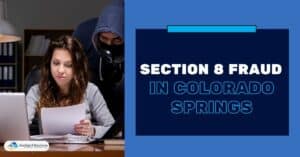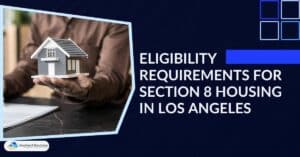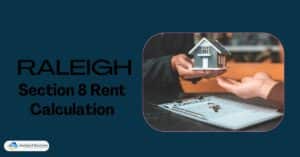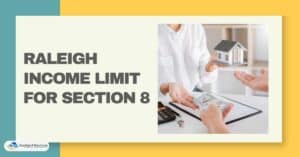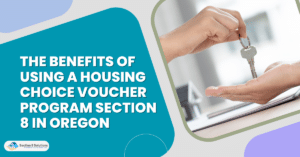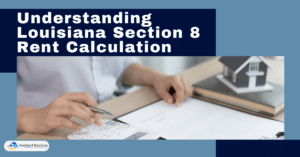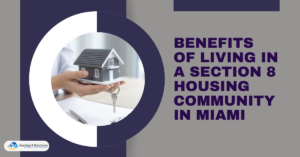To identify and report Section 8 fraud, look for signs such as subletting apartments or charging rents higher than fair market value. You can report fraud to the local housing authority or the Office of the Inspector General. Be prepared to provide as much information as possible, including the name and address of the alleged fraudster.
In this article, we will discuss how to identify and report Section 8 fraud. We will also cover the signs of fraud, the reporting process, and what happens after you report fraud.
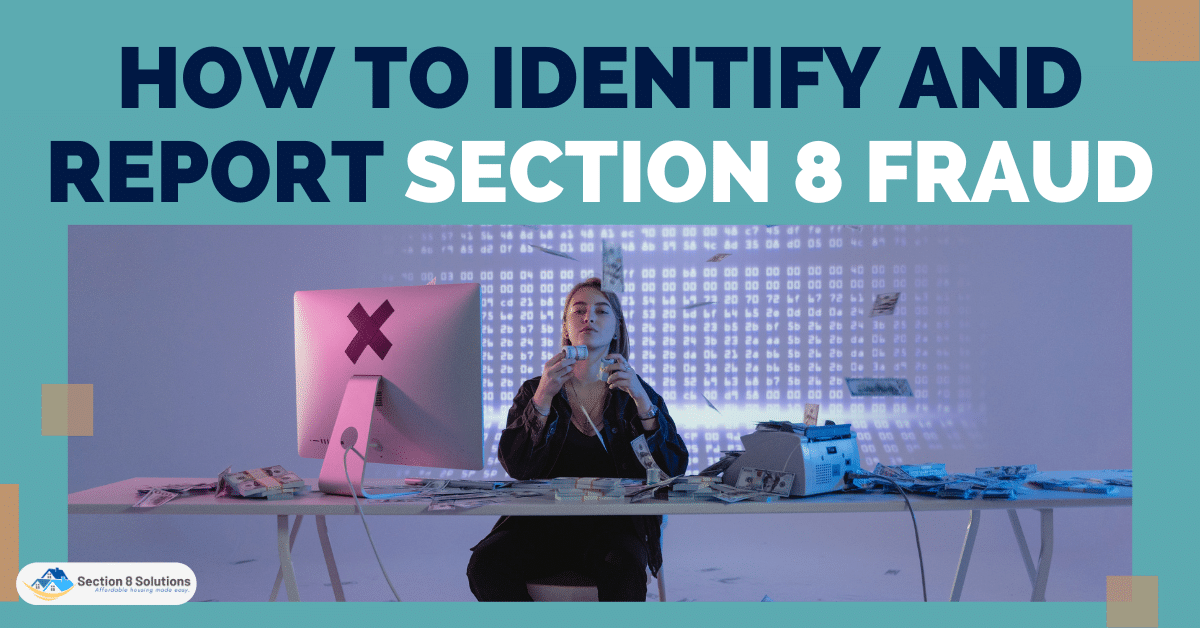
Understanding Section 8 Fraud
Section 8 fraud is any intentional misrepresentation, falsification, or omission of information related to the program. This includes lying on the application, providing false information about income or household composition, and subletting or renting out Section 8 properties without permission.
Hud fraud includes tenant-landlord collusion. Section 8 recipients commit tenant fraud by not reporting income, assets, or household changes that affect eligibility. Landlords that overcharge rent or misrepresent the property commit landlord fraud. Tenants and landlords lie to authorities.
The government and the needy suffer from Section 8 fraud. It steals resources from the needy and undermines the program. The program’s taxpayers are likewise overburdened. You may help guarantee that Section 8 resources go to people who need them by reporting Section 8 fraud.
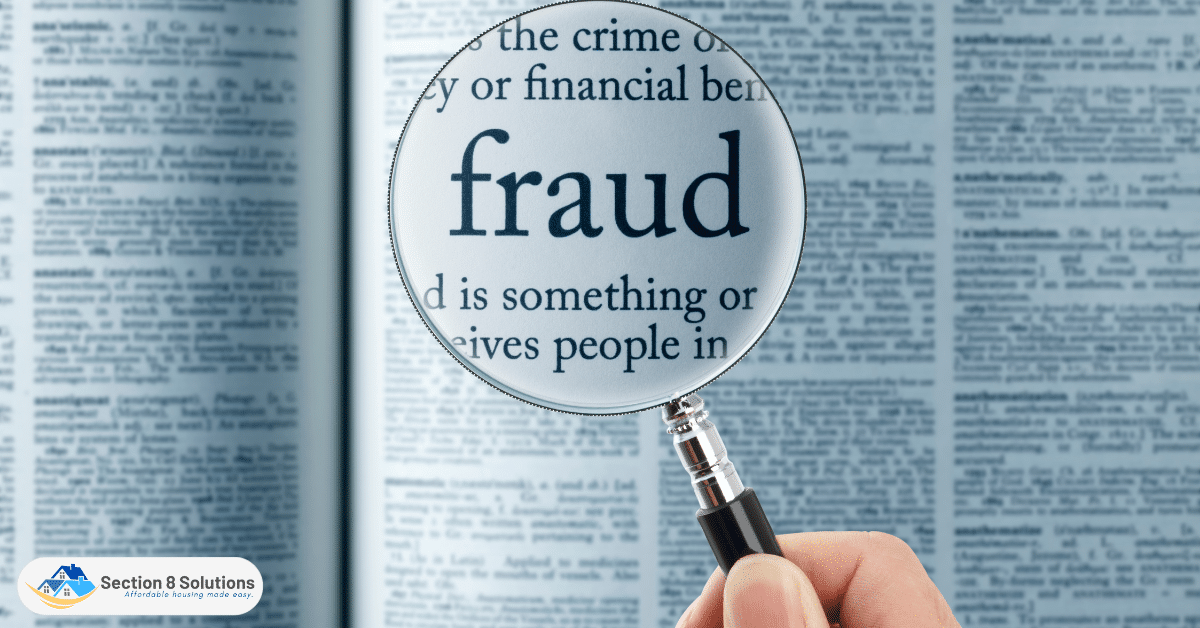
Signs of Section 8 Fraud
Knowing the indicators of Section 8 fraud helps avoid it and ensures resources go to people who need them. Identifying suspicious behaviors helps maintain program integrity and prevent resource exploitation. This section discusses common Section 8 fraud indications.
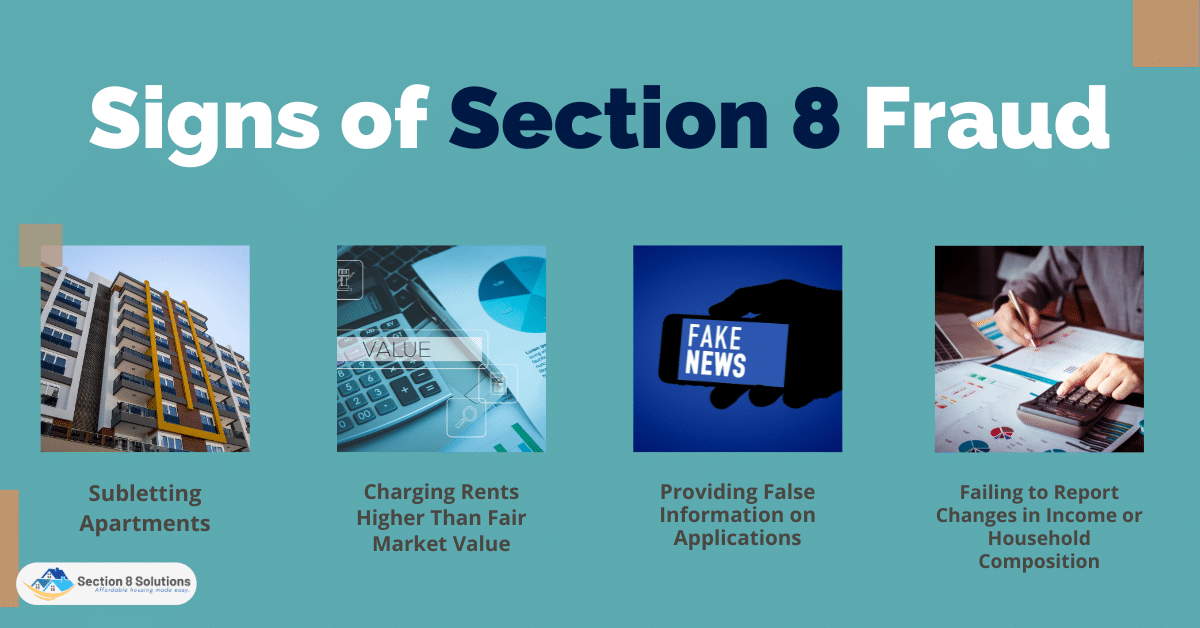
1. Subletting Apartments
Section 8 recipients cannot sublet or rent rooms without approval. The program provides affordable housing to low-income families, seniors, and disabled people who cannot afford good homes. Section 8 grantees who sublet or rent rooms could benefit from the program and take rental units from eligible families in need.
Subletting or renting rooms without permission is Section 8 fraud. That suggests the beneficiary may have unreported income, which could disqualify them from the program. Subletting or renting rooms without permission can cause overcrowding, which violates health and safety rules and endangers residents.

2. Charging Rents Higher Than Fair Market Value
Imposing rents that are higher than the current value of the market it is possible for landlords to commit fraud under the Section 8 housing assistance program if they charge rents that are much greater than the worth of the rental unit on the market. This is due to the fact that the Section 8 program pays landlords the rent that is considered to be appropriate for the area in which the rental property is situated. If a landlord is charging more than the value that would be considered reasonable in the market, then they could be pocketing extra money that they are not declaring.
3. Providing False Information on Applications
Falsifying Section 8 applications constitutes fraud. Applicants who lie about their income, assets, or household composition to receive aid take resources from people who need them. Section 8 helps low-income families, the elderly, and the disabled afford a suitable home.
Falsifying information to qualify for the program violates the rules and compromises its integrity. False Section 8 applicants may get benefits while eligible families are refused. This strains resources and funds, affecting the program’s ability to help individuals in need.
Report any suspected Section 8 application fraud to the proper authorities. Doing so helps avoid fraud and ensures the program helps people who need it. Submitting erroneous information helps maintain program integrity and resource use.

4. Failing to Report Changes in Income or Household Composition
Section 8 recipients are required to report any changes in income or household composition to their local housing authority. Failing to do so may result in overpayments or underpayments of benefits, which can constitute fraud.
If you notice any of these signs of Section 8 fraud, it is important to report it to the appropriate authorities. By doing so, you can help ensure that the program serves its intended purpose and that resources are directed to those who truly need them.

How to Report Section 8 Fraud
If you suspect Section 8 fraud, it is crucial to report it in order to protect the integrity of the program and ensure that resources are being used appropriately. In this article, we will discuss the various options available for reporting Section 8 fraud.
Reporting Options
You have access to a number of various alternatives when it comes to reporting fraudulent activity involving Section 8 benefits. These are the following:
- Local housing authority – Each state and city has its own housing authority that is responsible for administering the Section 8 program. Contact information for your local housing authority can be found online or in the phone book.
- Office of the Inspector General (OIG) – The OIG is an independent agency within the federal government that is responsible for investigating fraud, waste, and abuse in various government programs, including Section 8.
- U.S. Department of Housing and Urban Development (HUD) – HUD is the federal agency that oversees the Section 8 program. You can report fraud directly to HUD by calling their hotline at 1-800-347-3735 or by submitting a complaint online.
When reporting fraud, be prepared to provide as much information as possible, including the name and address of the alleged fraudster, and any documentation or evidence that supports your claim. It is also important to note that you can remain anonymous when reporting fraud if you choose.

Detailed Explanation
When reporting fraud to the local housing authority, be prepared to provide as much information as possible, including the name and address of the alleged fraudster, and any documentation or evidence that supports your claim. The Office of the Inspector General (OIG) has a hotline that can be used to report fraud anonymously, and they accept tips via their website. When reporting fraud to the OIG, be prepared to provide as much information as possible, including the name and address of the alleged fraudster, and any documentation or evidence that supports your claim.
Importance of Providing Information
It is important to provide as much information as possible when reporting Section 8 fraud. The more information you can provide, the easier it will be for investigators to identify and investigate the alleged fraud. Additionally, providing detailed information can help prevent false accusations, which can waste resources and harm innocent individuals.
Reporting Section 8 fraud is an important part of protecting the program and ensuring that resources are directed to those who truly need them. If you suspect fraud, don’t hesitate to take action and report it to the appropriate authorities.

What Happens After You Report Section 8 Fraud
After you report Section 8 fraud, the appropriate agency will begin an investigation into the allegations. The investigation process can vary depending on the agency and the nature of the allegations. During the investigation, the agency will typically gather evidence and conduct interviews with those involved. If the allegations are substantiated, the agency may take action to address the fraud.
Possible outcomes of an investigation include termination of Section 8 assistance, repayment of improperly received benefits, and criminal charges. The specific consequences will depend on the nature and severity of the fraud.
It is also important to note that whistleblowers who report Section 8 fraud are protected from retaliation. The law prohibits landlords and housing authorities from retaliating against tenants who report fraud, including eviction or denial of housing assistance. If you experience retaliation for reporting fraud, you should report it to the appropriate agency.

How to Prevent Section 8 Fraud
Preventing Section 8 fraud is an important step in ensuring the program remains viable and effective in helping those who truly need it. Education and awareness are key in preventing fraud, as many people may not realize that certain actions are fraudulent.
Tenants and landlords can prevent fraud. Tenants must provide accurate and factual information on their Section 8 application, disclose changes in income or household composition quickly, and not sublet or rent rooms without prior approval. Fair market rates, property maintenance, and reporting fraud can help landlords prevent fraud.
The consequences for those who commit Section 8 fraud can be severe, including the termination of housing assistance, repayment of improperly received benefits, and criminal charges. It is important for all parties involved in the program to understand the seriousness of fraud and the potential consequences.

Conclusion
In conclusion, identifying and reporting Section 8 fraud is crucial to ensuring the integrity of the program and providing assistance to those who truly need it. Fraud can harm not only the government but also individuals who rely on housing assistance. It is important to take action if you suspect fraud and to report any concerns to the appropriate agency.
Remember, there are resources available for reporting and preventing fraud, including local housing authorities and the Office of the Inspector General. By working together, we can help prevent fraud and ensure that the Section 8 program is effective in helping those who need it most.

